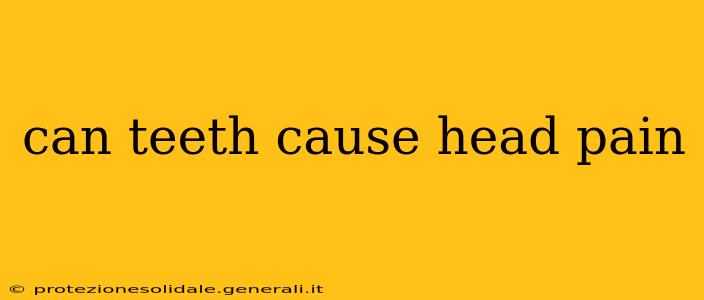Can Teeth Cause Head Pain? A Comprehensive Guide to Orofacial Pain
Headaches are a common ailment, and while many are caused by stress, dehydration, or sinus issues, it might surprise you to learn that your teeth can also be a significant contributor to head pain. The connection isn't always obvious, leading many to overlook dental problems as the root cause of their discomfort. This article will delve into the intricate relationship between teeth and head pain, exploring the various ways dental issues can trigger headaches and what you can do about it.
What types of teeth problems can cause head pain?
Several dental problems can lead to head pain, often manifesting as tension headaches, migraines, or even facial pain. These include:
-
Temporomandibular Joint (TMJ) Disorders: The TMJ connects your jaw to your skull. Problems with this joint, such as inflammation, misalignment (malocclusion), or arthritis, can cause significant pain radiating to the temples, ears, and even the head. TMJ disorders are a frequent culprit in persistent head pain.
-
Bruxism (Teeth Grinding): Clenching or grinding your teeth, often unconsciously during sleep, puts immense pressure on the TMJ and surrounding muscles. This constant tension can lead to debilitating headaches, jaw pain, and even earaches.
-
Dental Infections (Abscesses): An infected tooth or gum can cause severe pain, swelling, and sometimes, referred pain to the head. The infection can spread, causing inflammation and pressure that trigger headaches.
-
Sinusitis (sometimes related to teeth): While not directly caused by the teeth, sinusitis (inflammation of the sinuses) can sometimes be exacerbated by dental problems like infections. The proximity of the sinuses to the upper teeth means an infection can easily spread.
-
Dental Procedures and Trauma: Post-dental procedure pain, particularly after extractions or complex procedures, can lead to temporary headaches. Similarly, trauma to the teeth or jaw can cause lasting head pain.
How do teeth problems lead to head pain?
The connection between teeth and head pain often involves referred pain. This means that pain originating from one area (like your jaw) is felt in another (like your head). The intricate network of nerves in the head and face explains this phenomenon. Pressure, inflammation, or irritation in the jaw and surrounding structures can stimulate these nerves, causing pain to be perceived in the head.
How can I tell if my head pain is caused by my teeth?
Identifying the source of your head pain requires careful observation and a thorough examination by a healthcare professional. Here are some indicators that your teeth might be the culprit:
- Pain concentrated around the temples, jaw, or face: This suggests a potential link to the TMJ or surrounding structures.
- Pain worsened by chewing, yawning, or clenching your jaw: This points towards TMJ problems or bruxism.
- Sensitivity to pressure on your teeth: This might indicate a dental infection or other underlying dental issue.
- Jaw clicking or popping: A characteristic symptom of TMJ disorders.
- History of teeth grinding or clenching: Self-reported or observed by a partner.
What should I do if I suspect my teeth are causing my head pain?
If you suspect your teeth are causing your headaches, schedule an appointment with your dentist immediately. They can perform a thorough examination, diagnose the underlying problem, and recommend appropriate treatment. This might include:
- Mouthguards: For bruxism.
- Physical therapy or orthodontics: For TMJ disorders.
- Root canals or extractions: For dental infections.
- Pain medication: To manage pain in the meantime.
Can a dentist treat head pain?
While dentists don't treat all types of headaches, they can effectively diagnose and treat head pain originating from dental problems. They're uniquely qualified to identify and address issues like TMJ disorders, bruxism, and dental infections—all potential sources of head pain.
Remember, self-treating is not recommended. A proper diagnosis from a healthcare professional is crucial for effective treatment and pain relief. Ignoring dental problems can lead to more severe complications, so don't hesitate to seek professional help if you're experiencing persistent head pain.
